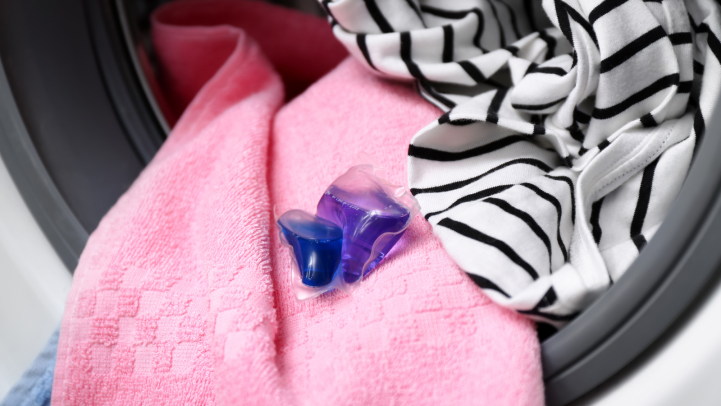
- Polyvinyl Alcohol Film (PVA/PVOH) Has Long Record of Safety, Biodegradability
- Campaigners’ Previous Claims Against PVOH Thoroughly Rejected by EPA
The American Cleaning Institute, (ACI) the trade association for the cleaning products supply chain, issued the following statement in response to a proposed bill in New York City that would restrict the use of polyvinyl alcohol, (also known as PVA or PVOH), a water-soluble polymer used to make sustainable laundry and automatic dishwasher detergent packets.
“The innovation of water-soluble films and laundry detergent packets is a sustainability success story. They help consumers safely use, dose and store the products, making chores easier to do for everyone, including those with disabilities. They can be designed for cold water wash cycles, reducing the footprint associated with heating water.
“They are also compacted – delivering a better clean as well as reducing shipping costs and transport emissions. More than 50 years of published science, including extensive reviews by regulatory agencies from around the world—including the Environmental Protection Agency (EPA) - have supported the environmental and human safety of PVA/PVOH (since the OH is the alcohol group when expressed in a chemical formula) for use in diverse industries.
- “Local legislation – such as a proposal introduced in New York City attempting to regulate a chemistry used in products sold across the United States – is not only unnecessary, as PVOH use in cleaning products is regulated by EPA, but also would limit detergent manufacturers in creating significant sustainable solutions that are delivering positive environmental impact and progress in cleaning sustainability.
- “ACI looks forward to providing the bill’s supporters with accurate information about the safety and biodegradability of this chemistry and the cleaning products that use it effectively.”
ACI also expressed disappointment with a campaign launched by the company Blueland to discredit polyvinyl alcohol use in detergents, despite decades of proof on safe use.
“Once again we are seeing a disappointing and disingenuous misinformation campaign launched against polyvinyl alcohol use in products like laundry packets and automatic dishwasher tabs.
And as in the past, the campaigners – led by Blueland – are relying on shoddy science and intentional distortions about this.”
Background: Liquid detergent packets (also known as capsules, pods or packs) and automatic dishwasher tablets are used safely and effectively in millions of households every single day. They have grown in popularity because they provide a convenient way to deliver the correct dose of detergent for maximum cleaning efficiency, as well as enable more sustainable innovation. Detergent packets contain highly concentrated cleaning formulas encased in a water-soluble film which is made of PVOH.
- These films are designed to dissolve completely in washing and dishwashing machines and then flow down the drain with the wash water.
- The films used in detergent packets, along with the ingredients they encapsulate, are safe to use in the home and meet rigorous, internationally approved test methods to ensure they fully dissolve and biodegrade after use.
- There are many different types of PVOH, as it can be modified to be more or less soluble depending on the desired performance required for its intended application. Water-soluble versions of PVOH have been used in an array of food products, tablets, medicines, eye drops and beauty products, as well as detergent packets, and have been found to be safe for human use.
- The PVOH used in detergent products is accepted by the U.S. EPA Safer Choice program and other strict ecolabeling organizations around the world.
- PVOH is listed on the EPA’s Safer Chemicals Ingredients List.
The campaigners’ previous claims attacking the safety and biodegradability of PVOH film used in detergents – in petitions filed with the EPA to restrict its use – were thoroughly rejected by EPA in 2023.
Now the latest line of attack claims that traces of the chemistry are found in breastmilk.
- To support its claims regarding breastmilk, the campaigners cite a single Italian study in which ONE PVA particle was identified in ONE sample drawn from ONE patient among 34 samples evaluated.
- The same study found microplastic particles of polyethylene, polypropylene, etc. in far greater abundance which also are the very plastics used for the spray trigger bottles used by companies such as Blueland.
- The study did not identify or attempt to identify the source of the particle and says that “it is impossible to isolate a specific source.” (including possible inhalation from air or ingestion from food or medicine)
- The identified particle by the study was brown in color, whereas PVA designed for detergent films is clear.
- The study also did not effectively control for other more likely routes of ingestion, including PVA approved for safe use in medical and food applications specifically designed for human consumption, which include food additives, pill coatings, medical devices, invitro gels, salves, eye drops, contact lens solution, among many others.
In addition, PVOH film does not contribute to plastic or microplastic pollution, nor does it persist in the environment or contaminate recycling. The grade of PVOH used in laundry capsules is specifically designed to completely dissolve upon contact with the water in the wash and biodegrade after it goes down the drain.
Additional information sources: Polyvinyl alcohol use/safety: Michigan State University
PVOH Biodegradability – American Cleaning Institute
The American Cleaning Institute® (ACI – www.cleaninginstitute.org) is the Home of the U.S. Cleaning Products Industry® and represents the $60 billion U.S. cleaning product supply chain. ACI members include the manufacturers and formulators of soaps, detergents, and general cleaning products used in household, commercial, industrial and institutional settings; companies that supply ingredients and finished packaging for these products; and chemical distributors. ACI serves the growth and innovation of the U.S. cleaning products industry by advancing the health and quality of life of people and protecting our planet. ACI achieves this through a continuous commitment to sound science and being a credible voice for the cleaning products industry.